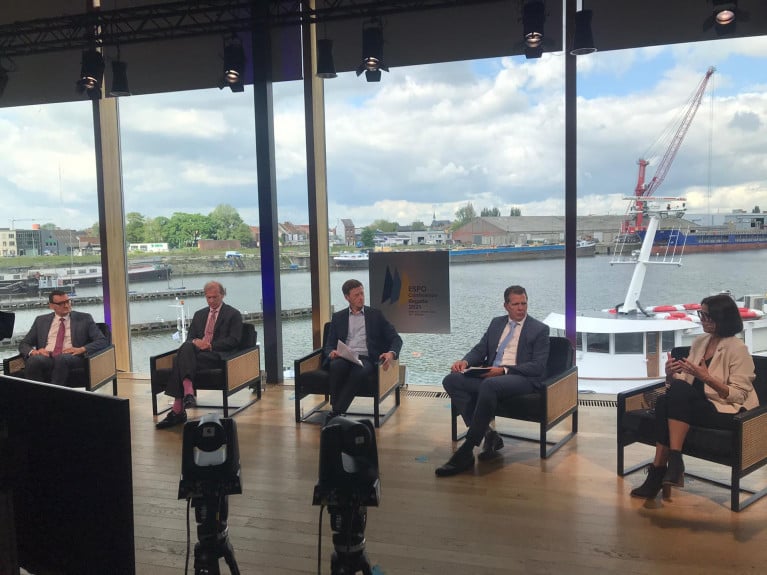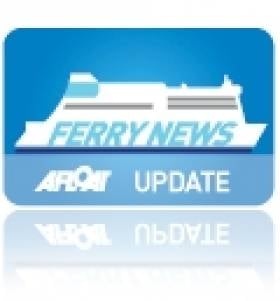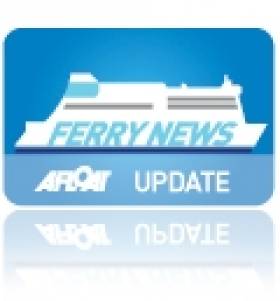Displaying items by tag: MOS
In the upcoming review of TEN-T guidelines, they have been one of the central topics during the first two days of the European Sea Ports Organisation (ESPO) Conference Regatta 2021.
European Transport Commissioner Adina Vălean, Motorways of the Sea (MoS) Coordinator Prof. Kurt Bodewig, Members of the European Parliament and port representatives presented and discussed their views and expectations of the upcoming review of Europe’s transport infrastructure policy.
“During the discussions with EU policy makers we have seen a clear recognition of the role of Europe’s seaports and a clear understanding that this should be translated in a policy that strengthens both the sustainability and resilience of the maritime and port sector, while addressing the needs in basic infrastructure and port connectivity. This very much aligns with our ESPO position where we call for a level playing field of the land-based and the maritime dimension of Europe’s transport network and for a recognition of the strategic and diverse role of ports. As gateways to the world, being at the crossroads of supply chains, as hubs of energy, industry and blue economy, ports can substantially contribute to a sustainable, digital and resilient European recovery,” says ESPO’s Secretary General Isabelle Ryckbost.
In her opening address to the ESPO Conference Regatta, European Transport Commissioner Vălean said: “Our ambition is to better integrate maritime links in the TEN-T as part of the logistic chain for obvious reasons related to decarbonisation and efficiency. In addition, we want to better connect maritime links of the core network with rail freight corridors and better integrate the Motorways of the Sea programme within the TEN-T policy.”
During his intervention, Motorways of the Sea Coordinator Prof. Bodewig approached the MoS concept as a sustainable, smart and seamless European Maritime Space, but acknowledged that in addition to these three pillars, resilience will play a central role for the European transport system. Increased resilience of the overall transport system requires a stronger maritime dimension, including more and new maritime connections, as well as the development of port infrastructure.
“A strong and resilient maritime sector is key to ensure a sustainable development and competitiveness of the European economy. I strongly advocate investments in fleet renewals, alternative fuels and last-mile connections to the TEN-T,” remarked the MoS Coordinator Prof. Bodewig.
Motorways of the Sea (MoS) Coordinator Prof. Bodewig during the ESPO Conference Regatta 2021
In his key note speech, EIB Vice President Kris Peeters emphasised: “We should still invest in basic infrastructure, but it is important to consider the value for the supply chains.”
In the lead-up to the Conference Regatta, the European Sea Ports Organisation had adopted a joint position on the TEN-T revision (enclosed), focusing on the following 11 points:
- The changing role of ports
- Basic infrastructure needs remain, but additional diverse infrastructure needs come on top
- The main goals of EU transport infrastructure policy
- A strong maritime dimension: levelling the playing field
- Greening the TEN-T network
- Adjustment of the network
- Ports as strategic nodes
- Last-mile a first priority
- European seaports are critical for a resilient transport system
- Enhancing the digitalisation of the port ecosystem
- Policy coherence and synergies
The full position can be found here.
Irish Sea 'Racehorse' Returns
Dawn Merchant and Brave Merchant represented the first pair of the 'Racehorse' class quartet of ro-pax sisters commissioned for the Cenargo Group. The quartet were built by Spainish shipbuilders Astilleros Espanoles SA in Seville, noting the first pair at 22,046grt where slightly smaller in tonnage terms compared to their 22,215grt counterparts Midnight Merchant and Northern Merchant. Upon delivery in 2000 the second pair were chartered to Norfolkline's Dover-Dunkerque route.
With a 130 truck capacity the Norman Trader can handle a marginally higher number of freight vehicles compared to the Norcape which handled 127 trucks. The Norcape, a 32-year-old freight-only vessel,was stood down in February and remains laid-up at Liverpool's Huskisson Dock. Incidentally, Norman Trader has joined one of her Racehorse class sisters, European Endeavour (formerly Midnight Merchant) which had directly replaced the Norcape on the central corridor route.
Likewise the European Endeavour is no stranger to the Irish route as for the last two years she has acted as winter relief vessel to cover the refits of the routes Dutch built ro-pax sisters Norbay and Norbank. The latter vessel is now undergoing a refit by Cammell Laird Shiprepairers in Birkenhead, now that the Norman Trader is in service to maintain the three-ship operated 8-hour route.
The Norman Trader had arrived into Dublin Bay last Friday from London's Tilbury Docks, on the next day she entered Dublin Port. In recent years she has operated on English Channel routes for the French shipping giant Louis-Dreyfus Armateurs through their ferry division LD Lines.
Norman Trader's (Dawn Merchant) sister Brave Merchant now renamed Norman Bridge also runs for LD Lines 'Motorways of the Seas' (MOS) route across the Bay of Biscay between Nantes /St. Nazaire to Gijón in northern Spain. The 14-hour route which started last year, which was run iniatially as a joint venture between Grimaldi Lines and Louis-Dreyfus and traded as GLD Atlantique.
- Dublin Port
- Bay of Biscay
- irish sea
- Ports and Shipping News
- Birkenhead
- Norcape
- RoPax
- DublinLiverpool
- Norfolkline
- FreightFerry
- Motorways of the Sea
- Norbank
- Norbay
- MOS
- European Endeavour
- Central Corridor
- P&O Irish Sea
- Norman Trader
- LD Lines
- Merchant Ferries
- Cenargo Group
- RaceHorse Class
- Tilbury Docks
- Cammell Laird
- Aintree
- Grand National
- Aintree Grand National
‘Proposed’ Cork-Spain Route Remains Under Review
In addition to services running out of Rosslare operated by Celtic Link Ferries and Irish Ferries and the alternative option of landbridge connections to Europe via the UK.
In the meantime, the Port of Cork will continue to be in dialogue with potential operators and investor's, however in the current climate it is proving more challenging to establish the service. Yet both the port authorities in Cork and Gijon remain committed in establishing the first direct Irish-Iberia passenger ferry route, with an update on the Spanish service due in early June.
Since 2008 the port authorities of Cork and Gijón, through the Promotion of Short Sea Shipping and Co-Operation with Small Medium Enterprise's (Proppose) an EU Inter-Reg project, have conducted feasibility studies into the service.
Interest in the service to date, has shown interest from Brittany Ferries, P&O Ferries and Transfennica, a Scandinavian based operator. It was envisaged that a ro-pax type of vessel would operate the 24-hour route to Gijón in Asturias, the region which forms part of Spain's northern 'Green' coast.
The route across the Bay of Biscay would be an attraction to freight hauliers, saving mileage and reduced fuel costs in addition avoiding a weekend ban to trucks travelling through France.
Last summer the ro-pax Norman Bridge started a new route between Nantes / St. Nazaire (Montoir-de-Bretagne) and Gijón, operated by GLD Atlantique. This route received support through the EU 'Motorways of the Seas' (MOS) programme to divert vehicle traffic from congested road-infrastructure and transferred to designated shipping routes, using larger and faster ro-pax vessels.
The route's opening was marked with a declaration signed by Dominique Bussereau, the French Minister of State responsible for Transport and his Spanish counterpart Magdalena Alvarez of the first of two Franco-Spanish MOS concept routes, starting with the 14-hour GLD Atlantique service.
- Irish Ferries
- port of Cork
- Celtic Link Ferries
- Fastnet Line
- P&O Ferries
- Brittany Ferries
- Ports and Shipping News
- Cork Harbour News
- RoPax
- Port of Gijón
- Proppose
- Motorways of the Seas
- MOS
- Transfennica
- CorkGijón
- Asturias
- 'Green'Spain
- Landbridge
- NantesSt.Nazaire
- GLD Atlantique
- Norman Bridge
- Cork Harbour

































































